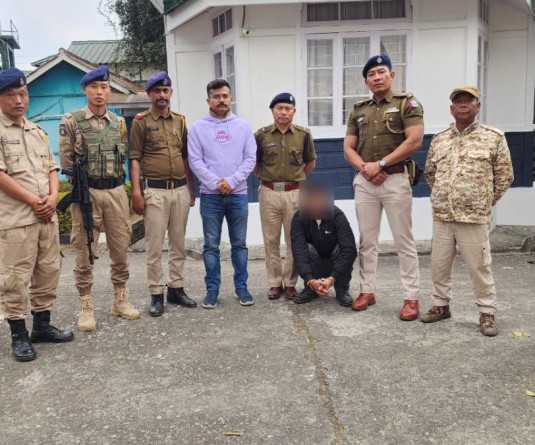
Chizokho Vero
Kohima | July 28
In the wake of fictitious offers doing the rounds, Reserve Bank of India (RBI) officials today advised the people of Nagaland to be alert and not to fall prey to such offers. Scam offers are in the form of lottery winnings, remittance of cheap funds in foreign currency, employment, scholarship offers and admission to reputed overseas universities, among others. It is learned that many people from Nagaland have also been receiving fictitious offers from outside, through SMSs and e-mails.
RBI regional director Surekha Marandi told media persons here that conmen are trying to convince the people through various means. He advised the people to be aware of such offers that are doing the rounds in the country and even reaching into Nagaland. Revealing scam modus operandi, RBI officials said that the fictitious offers are generally made through letters, e mails and SMSs. Apart from the typical modus operandi adopted in the past, frauds are now resorting to certificates, letters and circulars sent through e-mails, on letter-heads that look like that of the RBI’s and purportedly signed by its top executives, to make them appear genuine.
The conmen also convince would-be victims by impersonating as senior officials of the bank, with telephone numbers and fictitious e-mail IDs. There have been attempts to duplicate the RBI’s website to lure the public, it is learned. Conmen seek money from gullible people, under various pretexts, such as processing fees, transaction fees, tax clearance charges, convergence charges or clearing fees. Potential victims are persuaded to deposit an amount in accounts with various banks in India. Once the initial amount demanded is deposited, the money is withdrawn immediately and fresh demands for higher amounts follow in the name of transaction tax, registration money and so on, RBI said.
For account holders in inaccessible and remote locations in the northeast region such as Nagaland and Mizoram, conmen particularly target young people having bank accounts, to allow their accounts and debit cards to be used for depositing and withdrawing money. In this case, the account holder becomes party to criminal activity. A person allowing a fraud to use his account for committing frauds, in banking parlance, is called a ‘Mule’. Banks are monitoring suspicious transactions in accounts. If a person is suspected or reported to be a ‘Mule’, his account can be frozen and he can be prosecuted.
Marandi said one should not allow his account to be used by a third party for withdrawal or deposit purposes. In the event a debit card is lost, one must immediately report to the bank to cancel the card to prevent being used by others. People have to be very careful with their accounts, she said. Accounts in Nagaland are being misused by fraudsters and students going outside the state are being especially targeted.
She urged students to be very alert and careful with their accounts and cards and never allow anybody to use it.
The RBI said it does not maintain accounts in the names of individuals, companies or thrusts. RBI also does not open accounts for individuals to deposit money with the bank. Further, RBI does not issue certificates or confirmations or receipts evidencing the holding of money in these accounts. The Reserve Bank does not authorize any of its officials for such disbursals.
Also, sending remittances outside India for this purpose is against the provisions of FEMA, 1999. “In terms of the Current Account Rules framed under the Foreign Exchange Management Act, 1999, remittances in any from towards participation in lottery schemes or lottery like schemes, functioning under different names like money circulation scheme or remittances for the purpose of securing prize money/awards etc., are prohibited”. Accordingly, action can be taken against any person resident in India for collecting and effecting/remitting such payments directly/indirectly outside India for contravention of the Foreign Exchange Management Act, 1999.
“The Reserve Bank does not have any investigative powers to trace and book the culprits. Directorate of Enforcement is the investigating agency under FEMA, 1999. Nor does the RBI have power for criminal prosecution.” The Reserve Bank has taken several measures in this regard to create awareness among banks and the public about the fictitious offers. It had issued a number of AP (DIR Series) circulars in 2007, 2001 and 2002 cautioning the authorized dealer banks against remittances towards scheme involving money circulation, lottery schemes, etc and the existing prohibition on remittances for participation in such schemes.
Detailed press releases indicating the modus operandi of the fraudsters and cautioning the public against falling prey to fictitious offers to cheap funds from abroad were issued in 2007 and 2009 which have been placed on RBI website www.rbi.org.in as per permanent ticker. Commercial and cooperative banks have been advised to display copies of the Reserve Bank’s press release at all the branches in order to give it wide publicity.
The Reserved Bank has now issued another AP (DIR Series) this year explaining the modus operandi adopted by fraudsters. AD banks have been advised to exercise due caution and to be extra vigilant while opening or allowing transactions in such accounts. It is clarified that any person residing in India collecting and effecting/remitting such payments directly/indirectly outside India would make himself/ herself liable to be prosecuted, for contravention of the FEMA.
The RBI also informed that victims may register their complaints with the local police/cyber crime cells. Bank branches may also alert the local police including cyber crime cells, if and when they get lead about transfer of funds suspected of fraud involving accounts maintained with them or otherwise.






